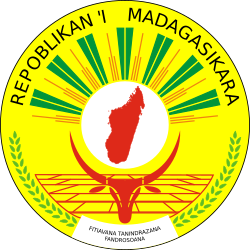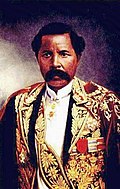| No. | Portrait | Name
(Birth–Death) | Term of office | Political party | High commissioner(s) |
|---|
| Took office | Left office | Time in office |
|---|
| French Madagascar (within the French colonial empire and the French Union) |
| Post abolished (February 1897 – 27 May 1957) |
| 7 |  | Philibert Tsiranana
(1912–1978) [c] | 27 May 1957 | 14 October 1958 | 1 year, 140 days | | PSD | Soudacaux |
|---|
| Malagasy Republic (within the French Community) |
| (7) |  | Philibert Tsiranana
(1912–1978) | 14 October 1958 | 1 May 1959 | 199 days | | PSD | Soudacaux |
|---|
| Post abolished (1 May 1959 – 26 June 1960) |
| No. | Portrait | Name
(Birth–Death) | Term of office | Political party | President(s) |
|---|
| Took office | Left office | Time in office |
|---|
| Malagasy Republic (independent) |
| Post abolished (26 June 1960 – 18 May 1972) |
| 8 | 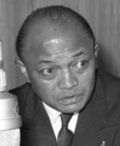 | Gabriel Ramanantsoa
(1906–1979) | 18 May 1972 | 5 February 1975
(Resigned) | 2 years, 263 days | | Military | Himself |
|---|
| Post abolished (5 February 1975 – 30 December 1975) |
| Democratic Republic of Madagascar |
| Post abolished (30 December 1975 – 11 January 1976) |
| 9 |  | Joël Rakotomalala
(1929–1976) | 11 January 1976 | 30 July 1976
(Died in office) | 201 days | | AREMA | Ratsiraka |
|---|
| 10 |  | Justin Rakotoniaina
(1933–2001) | 12 August 1976 | 1 August 1977 | 354 days | | AREMA |
|---|
| 11 |  | Désiré Rakotoarijaona
(born 1934) | 1 August 1977 | 12 February 1988 | 10 years, 195 days | | Military |
|---|
| 12 |  | Victor Ramahatra
(born 1945) | 12 February 1988 | 8 August 1991 | 3 years, 177 days | | Military |
|---|
| 13 |  | Guy Razanamasy
(1928–2011) | 8 August 1991 | 12 September 1991 | 35 days | | AREMA |
|---|
| Third Republic of Madagascar |
| (13) |  | Guy Razanamasy
(1928–2011) | 12 September 1991 | 9 August 1993 | 1 year, 331 days | | AREMA | Ratsiraka |
|---|
| Zafy |
| 14 |  | Francisque Ravony
(1942–2003) | 9 August 1993 | 30 October 1995 | 2 years, 82 days | | CSDDM |
|---|
| 15 |  | Emmanuel Rakotovahiny
(1938–2020) | 30 October 1995 | 28 May 1996 | 211 days | | UNDD |
|---|
| 16 |  | Norbert Ratsirahonana
(born 1938) | 28 May 1996 | 21 February 1997 | 269 days | | AVI |
|---|
| Himself |
| Ratsiraka |
| 17 |  | Pascal Rakotomavo
(1934–2010) | 21 February 1997 | 23 July 1998 | 1 year, 152 days | | AREMA |
|---|
| 18 |  | Tantely Andrianarivo
(1954–2023) | 23 July 1998 | 31 May 2002 [d] | 3 years, 312 days | | AREMA |
|---|
| 19 |  | Jacques Sylla
(1946–2009) | (26 February 2002)
27 May 2002 | 20 January 2007 | 4 years, 238 days | | Independent | M. Ravalomanana |
|---|
| — |  | Jean-Jacques Rasolondraibe
(born 1947) | 31 May 2002 | 5 July 2002 | 35 days | | AREMA | Ratsiraka |
|---|
| 20 | 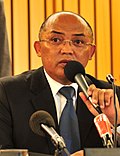 | Charles Rabemananjara
(born 1947) | 20 January 2007 | 17 March 2009
(Deposed) | 2 years, 56 days | | TIM | M. Ravalomanana |
|---|
| High Transitional Authority |
| 21 |  | Monja Roindefo
(born 1965) | (7 February 2009)
17 March 2009 | 10 October 2009
(13 November 2009) | 207 days | | Monima | Rajoelina |
|---|
| 22 |  | Eugène Mangalaza
(born 1950) | 10 October 2009 | 18 December 2009 | 69 days | | Independent |
|---|
| — |  | Cécile Manorohanta | 18 December 2009 | 20 December 2009 | 2 days | | TGV |
|---|
| 23 |  | Albert Camille Vital
(born 1952) | 20 December 2009 | 2 November 2011 | 1 year, 317 days | | Military |
|---|
| 24 |  | Omer Beriziky
(born 1950) | 2 November 2011 | 16 April 2014 | 2 years, 165 days | | LEADER-Fanilo |
|---|
| Rajaonarimampianina |
| Fourth Republic of Madagascar |
| 25 |  | Roger Kolo
(born 1943) | 16 April 2014 | 17 January 2015 | 276 days | | Independent | Rajaonarimampianina |
|---|
| 26 | 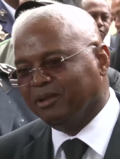 | Jean Ravelonarivo
(born 1959) | 17 January 2015 | 13 April 2016 | 1 year, 87 days | | Military |
|---|
| 27 |  | Olivier Mahafaly Solonandrasana
(born 1964) | 13 April 2016 | 4 June 2018 | 2 years, 52 days | | Independent |
|---|
| 28 |  | Christian Ntsay
(born 1961) | 4 June 2018 | 6 October 2025 | 7 years, 122 days | | Independent |
|---|
| Rakotovao |
| Rajoelina |
| Himself |
| R. Ravalomanana |
| Rajoelina |
| 29 |  | Ruphin Zafisambo | 6 October 2025 | 20 October 2025 | 14 days | | Military |
|---|
| Randrianirina |
| 30 |  | Herintsalama Rajaonarivelo | 20 October 2025 | Incumbent | 11 days | | Independent |
|---|

